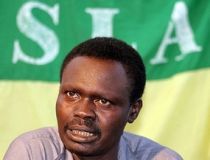Darfur peace faction call for probe into Muhajiriya attack
October 11, 2007 (KHARTOUM) — Darfur’s former rebels on Thursday called for an international investigation into an attack on their forces in Muhajiriya, where at least 45 were killed and dozens injured.

“There has to be an international investigation immediately,” Minni Arcua Minawi, the head of the SLA who became presidential adviser in Khartoum after his was the only rebel group to sign a May 2006 peace deal.
“We are committed to the peace and the ceasefire but we want the government to not repeat any action like this.”
The attack on Muhajiriya, Minawi’s main town, was the latest in an upsurge of violence in southern Darfur after the worst attack on African Union peacekeepers since they deployed, killing and wounding at least 20 and destroying their base in Haskanita.
A U.N. statement said “tens of civilians were killed and wounded, and tens are reported missing, including children”.
Minnawi said at least 40 civilians were killed and five of their soldiers.
Two aid agencies working in the town evacuated 29 staff after they were trapped in their compounds by the fighting.
Minawi said his movement had written a formal complaint to the United Nations and African Union about the assault.
The army blamed tribal clashes between the Zaghawa and Maaliya in the area. Minnawi’s party accused Khartoum earlier this year of arming the Arab Maaliya tribe.
“This is the behaviour of the government. They will never commit to any agreement,” Minnawi told Reuters from Darfur.
“This will have a negative effect on peace talks,” he said.
LIBYA TALKS
Minawi is in Darfur ahead of peace talks set for Oct. 27 in Libya, and is due to meet rebel factions who reject last year’s deal to persuade them to attend talks and unify their ranks.
Since the 2006 deal, rebels have split into more than a dozen factions and formerly pro-government militias have turned on each other, creating a chaotic security environment which the AU peacekeeping force has been unable to quell.
In a report made public on Wednesday, U.N. Secretary-General Ban Ki-moon said he was “extremely concerned” about the “unacceptable” violence in the vast western Sudanese region, which he said was “not contributing to an atmosphere conducive to the peace talks”.
He said the attack on the AU peacekeepers “confirms that the … force which will be deployed to Darfur must be sufficiently robust to defend itself from spoilers and protect civilians from attack”. A 26,000-strong AU-U.N. peacekeeping force is planned.
The Libyan talks will be between the Sudanese government and a range of Darfur rebel movements to try to end the four-year-old conflict. They will be jointly mediated by the United Nations and the African Union.
Mostly non-Arabs took up arms in early 2003 accusing Khartoum of neglect. International experts estimate 200,000 have died and 2.5 million driven from their homes in 4-1/2 years of fighting.
Khartoum puts the death toll at 9,000 and says the West has exaggerated the conflict in Darfur.
The violence has cast a shadow over attempts to bring all rebel groups into the peace process.
“It highlights the urgent need for a new, broad based ceasefire … that reflects the multitude of armed actors on the ground today in Darfur, said think tank International Crisis Group’s Sudan expert, Dave Mozersky.
“This should be the first priority for new talks.”
The world’s largest aid operation has been closed in by the renewed fighting, with movement severely restricted and most aid workers travelling only by air after a spate of carjackings.
The United Nations said it had relocated its staff from Tawila town in North Darfur after fighting there two days ago. Amnesty International warned an offensive in North Darfur was imminent as government troops amassed in towns.
The U.S. embassy said it was temporarily evacuating all its staff from Darfur, including USAID and other State Department employees. (Additional reporting by Andrew Heavens).
(Reuters)
